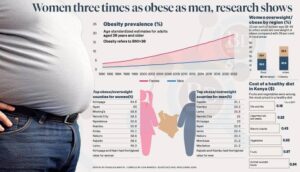A recent study has shed light on a concerning trend in Kenya, revealing that women in the country are experiencing higher rates of obesity compared to their male counterparts. The findings, published in the Kenyan Business newspaper BusinessDaily and conducted by the NCD-Risc network of health scientists, point to lifestyle factors and dietary habits as key contributors to this disparity.
According to the report, 19.3% of Kenyan women are classified as obese, in stark contrast to just 6.3% of men. This translates to approximately 2.7 million obese women compared to 760,000 men as of 2022, indicating a significant gender gap in obesity prevalence.
The study highlights several factors driving this disparity, including poorer eating habits and reduced physical activity among Kenyan women compared to men. Research published in Frontiers in Nutrition underscores the role of lifestyle choices in obesity, emphasizing the importance of diet and exercise in managing weight.
Genetics also play a role, with individuals from families predisposed to obesity at higher risk themselves. Additionally, hormonal factors, particularly estrogen levels in women, may contribute to increased fat accumulation in certain body areas such as the hips, thighs, and breasts.
Also, read: Ex South African President Jacob Zuma Survives Car Crash Following Electoral Disqualification
Regional variations in obesity rates were also noted, with Kirinyaga and Nyeri recording the highest rates among women, while Kajiado and Kiambu showed higher rates among men, according to data from the KDHS social survey conducted by KNBS.
Obesity is associated with a range of health issues, including diabetes, heart disease, and certain cancers, underscoring the urgency of addressing this public health challenge. Professor Ezzati, an expert in global environmental health, pointed to the impact of marketing campaigns for unhealthy foods in influencing dietary habits among Kenyan women.
Moreover, the cost of maintaining a healthy diet in Kenya poses a significant barrier, with a World Bank study from 2017 revealing that the average cost is $2.86, with fruits and vegetables being particularly expensive.
As efforts to tackle obesity continue, addressing these systemic issues will be crucial in promoting healthier lifestyles and reducing the burden of obesity-related diseases in Kenya.
